- Nicholas
Cornish 1832-1892, NE's father


Huntsman & Game Keeper
b.c1832 St Davids, Exeter, Devon
d.4 Apr 1892 Portgate, Northumberland
It is here with this Nicholas Cornish that the family connection becomes a bit fuzzy, as his true parentage has not been determined. Records indicate that he was born in Exeter and brought up in the household of Nicholas Cornish and his sister Sarah at Pullerton, in the parish of Newton St Cyres. In the 1851 census return he is referred to as nephew of Nicholas of Newton St Cyres, and by time the said Nicholas writes his Will in 1857 he has become his son. There is not the slightest doubt that the elder Nicholas ever married – this is implied in the 1841 census and stated clearly in the 1851 census. Hence, Nicholas Junior must have been an illegitimate son or somebody he was happy to declare to be his son for inheritance purposes. In 1861 Nicholas was living in Bidwell Barton, Newton St Cyres, where he was a Farmer of 155 acres. In 1863 he was declared bankrupt – his great granddaughter (Joyce Clandillon) has a desk which was owned by him and which he hid in a shed before the bailiffs came and took everything. Also saved from the sale was a silver coffee pot which is now in the possession of our family. Nicholas eventually moved to Lincolnshire and then to Northumberland where the family settled in Portland, a small hamlet near St John Lee. In 1871 and 1881 the family lived at Fences and in 1901 at Stanley Cottages, where Nicholas is now described as a Game Keeper, rather than Huntsman. -- Barbara Tunley
I saw that Sue Taylor and the Tunley's have been searching and posting about our Great-great-grandfather Nicholas Cornish (b:1833) since at least 2000. Many interesting details, (like he was a ship owner, and that he went bankrupt because his partner ran off with the money) that I hadn't heard of before were included in various postings. -- Al Fei
From Ancestry.com Wills and Probate: CORNISH Nicholas of Stanley Cottages Portgate Northumberland died 4 April 1892. Probate Newcastle-Upon Tyne 6 July to Joseph Cornish and William Walter Cornish bank clerk Effects £1180
- Anne Frost
1837-1914, NE's mother


bp. 12 Mar 1837 Topsham d. 1914 Hexham, Northumberland m.13 Aug 1857 Christ Church, Exeter, Nicholas CORNISH, 1832-1892
- Nicholas Edward (N. E.) Cornish
1858-1947, civil engineer, England and China


bp.24 Oct 1857 Newton St.Cyres d. 19 Feb 1949 Tenbury (Will); at one time worked at Woolwich Kent and Shanghai, China Arsenals m. 1878 Newcastle-upon-Tyne, (1) Annie NICHOLSON, d. 13 Apr 1924 Newcastle (Will) m. 1924 Paddington (2) Florence MARSHALL -- Barbara Tunley
NE lived with Edward's family from about 1943 until he died in 1949. This was in Tenbury Wells. Edward's father was NE's nephew. NE's daughter also lived in Tenbury then and hopefully they saw each other regularly. I am coming to the conclusion that although NE and Annie Nicholson didn't divorce I think they may have separated as they were obviously apart for long periods of time. NE also married Florrie the same year that Annie died and I have several letters from 1914-16 adressed to NE when he was living in London and not in Northumberland with his family. I may be jumping to all the wrong conclusions!! -- Janet Greenwell
- Joseph Cornish
1859-1948
- Walter Cornish
1861-1925
- Annie Cornish
1863-?
- Mary Eliza
Cornish 1865-1952
- John Henry
Cornish 1868-1941
- Laura Cornish
1870-1931
- Bessie Eliza
Cornish 1874-1875
- Lucy Cornish
1876-?
- Nellie Cornish
1879-?
 Cornish sisters
Cornish sisters
- Annie
Elizabeth Bell Nicholson Cornish, 1850-1924
From Ancestry.com Wills and Probate: CORNISH Annie of 3 Crown Street Newcastle-Upon -Tyne (Wife of Nicholas Edward Cornish) died 13 April 1924. Probate Newcastle-Upon-Tyne 12 June to George Thomas Nicholson draughtsman and Annie Cornish spinster. Effects £2577 14s 5d.
[She left everything to her son from her first marriage and her daughter with N. E. Cornish, nothing to N. E. himself]
Born Annie Elizabeth Bell in 1850, she married a George Nicholson in 1867, and had a son, George Thomas Nicholson, in 1869. In 1878, she married Nicholas Edward Cornish (when he was 21 and she was 28, and her son George was 9). She had a daughter, Annie Cornish, in 1880. http://www.wikitree.com/genealogy/Bell-Descendants-5210
- LingLing Tai
- unknown name,
perhaps the grandmother mentioned in book by Chi-Yun Fei
Eskelund
- Annie Cornish
1880-?, daughter of N. E. Cornish and Annie Elizabeth Bell
Nicholson Cornish; second wife of Wilson Faithfull

Annie Cornish was the daughter of NE Cornish and Annie Nicholson, born before NE left for China. Annie's aunt Laura Cornish (NE's younger sister) married Wilson Faithfull in 1899, when Laura was 29. Laura died in 1931 at the age of 61. In 1934, Wilson married Annie, his late wife's niece, age 54.
From Simon Faithfull: "I remember Annie well, and I certainly remember have once had pictures of her - I also have an 8 mm cine film somewhere, in which she was sitting with me in 1965 in my MGA! Maybe I will come across that one day, but I have no idea where it is! I remember how amazed I was to see a marked resemblance between her and Elizabeth Cornish Fei, when I saw her photo ." (photo above courtesy of Simon)
- Elizabeth Tse-Vong Cornish 康彩鳳 康彩蓉
1890-1986 Charity organizer, Peking; retired,
California/China photos
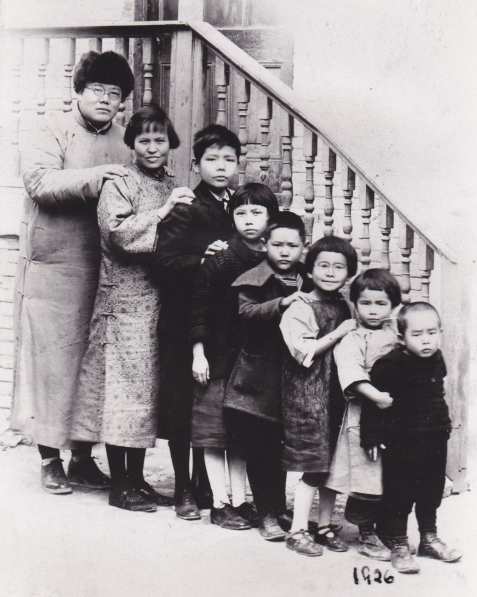

Grandma was born on March 18, 1890 in Shanghai, China to Mr. N. E. Cornish and his Chinese wife. Elizabeth's mother died very young and Elizabeth was raised by Chinese relatives, the Hsu (Suvoong) family. She only met her father once.
Elizabeth went to Oberlin University, Chicago, Illinois in 1907, possibly paid for by her father. She remembered seeing Portsmouth Square in San Francisco's Chinatown. At Oberlin she met her husband Jack Fei and they were married in Chicago. Elizabeth majored in kindergarten normal. I remember she sang the kindergarten songs she had learned in preparation to be a teacher, but she never taught in a school.
She and her husband moved back to China and settled in Beijing. They had 7 children and lived near Deng Shr Kou (Lantern Cross Corner) in old Beijing. Elizabeth raised 7 children with the help of servants and had all her daughters take piano lessons and the older children enrolled in Peking American School. The older children grew up speaking fluent American English. Elizabeth's husband died in 1946.
She remained in China until l961, when she moved to live with her daughter Rose and son-in-law Kou Tsun Chang in Redondo Beach, California. When I met Grandma (we called her Lao Lao), we were the exact same height. Grandma taught my younger brother Gray how to read and once polished his tennis shoes with white shoe polish. She had a pet chihuahua and loved to sew clothing, especially Chinese jackets and blouses with "frog" buttons made out of fabric. She taught me how to sew. I remember threading needles for her. Grandma loved to sign hymns and go to church.
The most famous story about her is when she walked all the way to the Redondo Beach pier, about three miles away, was too tired to walk back, and "hitched" a ride back with a young American man by waving her arms and asking for a ride. She wanted to thank him, so she invited him in for a hot dog, that being the most likely food he would appreciate. I remember she referred to hot dogs and hamburgers as foreign food.
In her later years Grandma lived with her oldest son Albert in Pacific Grove, California. She also lived in the Pilgrim Haven home in Los Altos, California and with her daughter Ellen at the Binkley's ranch in Saratoga, California. She spent her last few years in Beijing in the care of her Fei relative Uncle Oberlin.
Grandma was a sweet one, snipping roses from neighbor's bushes to plant as her own. I remember her frying chicken for us, yum! She taught us about being kind to others and doing the right thing. She always saved her desserts for us. What a grandma! I miss her braids up on her head and her teeny tiny feet. -- Julie Chang - John Smith,
son of N. E. Cornish and a Chinese mother
- Hsing-Jen (Jack) Fei 費 1886-1946
Businessman, Peking

Boxer Indemnity Scholars article
Yale obituary 1949
Hsing-Jen Fei's parents, Chi Fung and Hsu Chu:
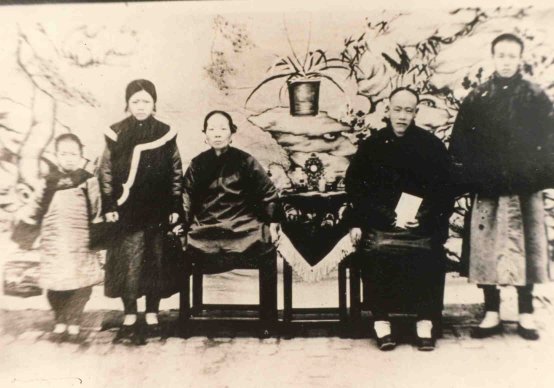
- Frances, Chinese wife of John Smith
- Grace Smith
- Joe Smith, died July 4, 2010

- Winnie Smith
- Albert Fei 費景云 1915-1978, Chinese
language teacher, Monterey, California
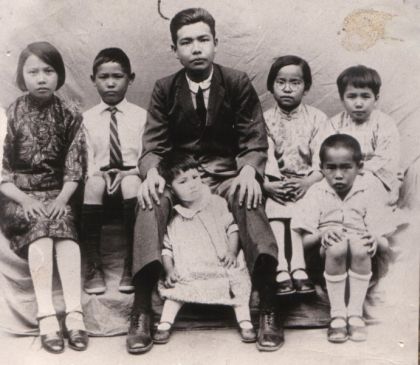
The Fei children, c. 1929, clockwise from left: Ellen, Edward, Albert, Mary, Rose, John, and Bessie
- Ellen Fei 費皎云 1916-2012, Nurse,
China; retired, California

- Edward (Eddie,
Ed) Fei 費景天 1919-1976,
U. S. diplomat
I attended the Peking American School and knew Eddie Fei well. He was a year ahead of me in school. I also knew Mary Fei, a lovely, gentle and quiet girl. Eddie had some connection with the manufacture of fireworks in Peking, and it was he who furnished the rest of us with fire works at times. I recall a particularly villainous package of crackers that we attached to the rear axle of the Chevy convertable driven by Mr. Hewitt, a teacher who had come out from the States. They went off like a machine gun and poor Mr. Hewitt thought he was being fired upon by Chinese revolutionaries, who were everywhere in those years. I'm afraid we were very bad boys, and may have led Eddie astray. -- Kim Krenz
What a little treasure that story is! I'd heard my father's nickname was 'the black sheep of Dun Sher Ko' for his mischievous exploits, and this confirms it. -- Rosemary Fei
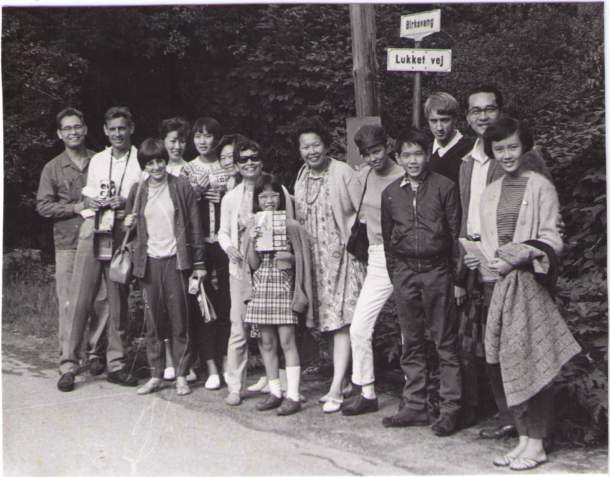
Summer 1967: Edward Fei, Karl Eskelund, Mary Kurth (Julie's friend), Bessie Fei Lin, Julie Chang, Anne Chang Fei, Mary Fei Eskelund, Rosemary Fei, Rose Fei Chang, Mei-Mei Eskelund, Gray Chang, Kjeld Thue Tobiasen (Mei-Mei's husband), K. T. Chang, Ivy Lin
- Mary Chi-Yun
Fei 費綺云 1918-2000, Author and
TV personality in Denmark
From her Danish obituary (translated by Google): The author Mary Chi-Yun Eskelund Nyvig, Værløse, is dead. She was 82 years. Under the name Chi-Yun Eskelund she became known to the public when her husband, travel journalist Karl Eskelund published the book "My wife eats with sticks." She was born in Beijing, and the couple were married in 1939 at the Danish consulate in Shanghai. After the war they took residence in Denmark, but travel around the world continued. In the late 1960s was the couple divorced, and Chi-Yun Eskelund began writing, first cookbooks and later memoirs about his childhood in Beijing and a book about the relationship with Karl Eskelund, 'My Casanova'. In addition, she was assigned to the University of Copenhagen as a language teacher. Chi-Yun Eskelund was later married again with the late urban planner Anders Nyvig. Chi-Yun Eskelund was a member of the culinary academy.
- Rose Mei-Yun
Fei 費美云 1921-2016,
retired school nurse, t-shirt
artist, California
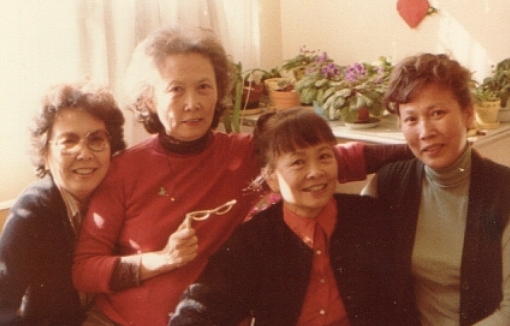
The four Fei sisters, from left to right: Rose, Ellen, Mary, and Bessie, 1980s
- John Fei 費景漢 1923-1996,
economist, Yale professor
John C.H. Fei, professor emeritus of economics, whose writings in the field of economic development are now considered classics, died of cardiopulmonary failure on July 19 in Taipei, Taiwan. He was 73 years old.
Professor Fei's five books and over 70 articles influenced the economic policies of many countries. In fact, for several decades he actively advised the Taiwan government on economic policy issues. Since retiring from Yale, he had been serving as chair of the board of trustees of the Chung-Hua Institution for Economic Research in Taipei, and shortly before his death, he was appointed as a personal advisor to the President of Taiwan. In recognition of Professor Fei's contributions to that nation, the Taiwanese government held a state funeral in his honor.
Described as a "dynamic and lucid lecturer," Professor Fei inspired generations of students from the United States and abroad, some of whom later went on to top leadership positions in their countries. The latter include President Lee Teng-hui of the People's Republic of China and President Ernesto Zedillo Ponce de Leon of Mexico.
Professor Fei's research centered on development theory, in general, and its application to Asian development, in particular. He is perhaps best known for the 1964 book "Development of the Labor Surplus Economy: Theory and Policy," which he coauthored with Professor Gus Ranis of Yale and which is credited with opening up new literature and debate in the development field.
Born in Beijing, China, in 1923, Professor Fei completed his undergraduate studies at Yenching University in 1945. Soon afterward, his family emigrated to the United States, and he subsequently earned a M.A. in economics from the University of Washington in 1948 and a Ph.D. from the Massachusetts Institute of Technology in 1952.
He came to Yale in 1962 and was a noted contributor to the University's department of economics and Economic Growth Center for almost three decades. He also taught at M.I.T., Antioch College, the University of Washington and Cornell University, where he held the Carl Marks Chair in economics.
A long-time consultant to the Agency for International Development and the National Planning Association, in 1972 Professor Fei was elected to membership of the Academia Sinica in Taiwan, Republic of China.
He is survived by his wife, Alice L.H. Fei of Alexandria, Virginia; and by three sons from a previous marriage, Jack Fei of Minneapolis, Minnesota, Albert Fei of New York City, and Calvin Fei of Walnut Creek, California; and by four grandchildren.
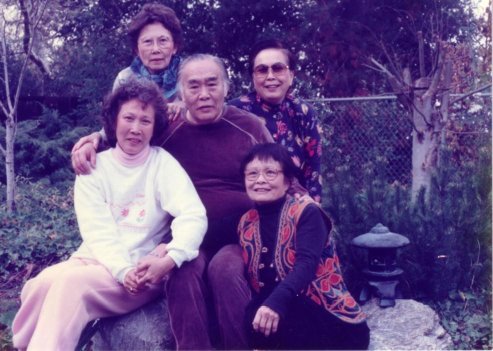
John with sisters Ellen, Rose, Bessie, and Mary; 1980s
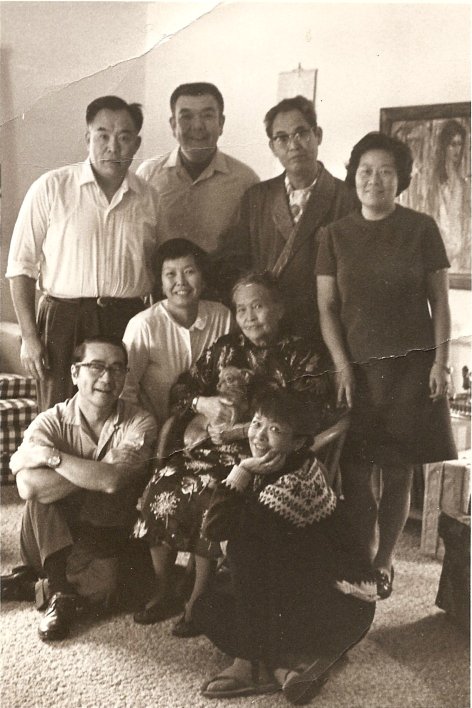
John, Albert, Edward, Anne, Rose, Elizabeth, KT, Mary; c. 1970
- Elizabeth
(Bessie) Fei 費裁云 1920s-, U. S. Counsulate worker, Hong Kong;
retired, California
- Sophia
(Sophie) ShanTze He 賀善慈
- Theodore
(Teddy) Fei 費大成
- Eddie John (E.
J.) Fei 費爾成
- Edward (Eddie)
Lei 雷愛德
- Johnny Lei 雷韶笙
- James (Jimmy)
Lei 雷韶文
- Judy Lei 雷韶英
- Jean Lei 雷韶蓉
- Anne Chang 張秀愛
- Ed (Eddie Jr.)
Fei 費大川
- Jean (Jeanie)
Fei
- Rosemary Fei,
lawyer, Adler
&
Colvin, San Francisco

- Karl Eskelund 1918-1972,
Danish journalist and author, see Wikipedia
article
- Mei-Mei Eskelund 1941-1973

- Kuo Tsun
(K. T.) Chang 張囯駿 1920s-, retired aerospace engineer, book author,
California

- Timothy (Tim)
Chang 張振人

- Juliann
(Julie) Chang 張振玫

- Gray Chang 張振民 1950s-,
Technical
Writer,
1980s computer game
designer, California

- Katherine T. Sheng 盛冬嘉 1921-1997,
California
- Jack Charles
Fei 1949-, Microsoft Windows Systems Engineer, Twin
Cities, Minnesota
Linked-In Profile: http://www.linkedin.com/in/jackfei
Personal story: Chinese American Exclusion/Inclusion
- Albert (Al)
Fei
- Calvin (Cal)
Fei
- Baoling Lin 林葆齡
- Ivy Lin 林曉寒
- Victor Lin
林建榕
- Leo Lin
林建初
- Ruth Qin 秦玉池
- Edward Lei 雷紅楓
- Esther Chen 陳珊珊
- Edith Lei
- Zhenyu Hou
侯振宇
- Renee Hou 侯金棠 1970s-,
psychologist,
California web page
For old Lei/Fei family photos, from Renee's website, click Gallery, then GrandmaEllenFei
- Phil Young 楊志華
- Yvette Young
- Gretchen Sandels
- Evonne Fei 費天愛
- Lloyd Woodcock
- Milo Woodcock
- Gary
Harrington
- Cooper
Harrington
- Mallory Harrington
- Portia Choi
- Conrad Chang 張興阜
- Martin Chang 張興朝
- Robert (Bob)
L. Sommers
- Brian Sommers 夏興陸
- Roseanna Sommers 夏碧梅
- Ana Chou
- Tamara Chang 張興洲
- Olivia Chang 張興宇
- Linda
- Elizabeth Fei
- Barbara
Tapalow
- Jordan Fei
- Lee Tai
- Trevin Fei
- Carissa Fei
- Sue Fen
- Steven Lin
- Michael Lin
- Karen
- Laura Lin 林瑋珊
- Corey
Woodcock
A family tree update from Jean (#41), February 2014:
I've been looking at the impressive family tree you have assembled. There are quite a few new comments since I last visited. It's so nice to have; my own computer crashed and I lost photos and an article about Grandma's wedding in their Church Bulletin and other mementos.
I would love to add in Corey Woodcock's (#93) partner, Emily Enslow, and their two children, Carson Christopher Woodcock, and Parker Owen Woodcock, my grandchildren.
Also, I'm nudging Evonne (#66), because she just had a new little girl in December, Mila.
Cousin Jean
- Esther
Chen
- David
Fei
- Joseph
Fei
- Jeffrey
King
1970s-, family practice physician, California
web page
- Kate
King
- Amy
Hoare
second wife of John Smith
- Ray Bougery, Frenchman
 Grace Smith and Ray Bourgery
Grace Smith and Ray Bourgery
 Family Tree
Family Tree
- Ellen Mary Feng Smith
- Alan Milne
- Madelaine Milne
- Janine Milne
- Hugh Milne
- Nicole Smith Bond
- Russel
Bond
- Douglas
"Johnny" Milne
- Robyn
Milne Gumley
- Alistair
Gumley
- Neil
Gumley
- Kassandre
Murby
- Lachlan
Gumley
Boxer Indemnity Scholars article
1907 Chinese Exclusion Act file on Elizabeth Cornish from National Archives (8MB PDF file)
Notes from Bessie Fei Lin 2018:
Born in Shanghai, Elizabeth Cornish had to have a Chinese name to start school. Kang was chosen because it sounded close to Cornish. Kang is also a proper surname in China.
Kang Tsai-Feng had to be changed to Kang Tsai-Rong when she married Fei Hsin-Jen, because his father's Chinese name was Fei Chi-Feng and she could not use the same word as the old man's.
Kang had nothing to do with the hutong Kang-Jian, meaning healthy. (hutung is the alley way)
Teng Shi-Kou (Lantern Intersection) was a big street, in Chinese it had Da-Ji. (Da Jie means big street). Nobody used it because it was well known. In recent years, the side treet of another name on the west side of T-sh-Kou because Ten Shi-Kou Xi Jie (west street) so the word Main Street had to be used.
The Fei family originally lived in #38 Teng Shi -Kou. Fei Hsin-Ren bought #37, a 3 storied building with 4 courtyards behind the building 336 was a side door connected to another courtyard.
The 3-story building was a business called Peking Craft Shop: a showroom and export for curios and Chinese carpets.
The huge stone turtle with a stone slab on its back, now standing in Harvard University, was obtained by Hsin Jen Fei, packed and shipped to Harvard. I remember horses coming into the front courtyard, pulling the packed turtle on rolling logs... train, ship...
Wikipedia article on Harvard Bixi
Below: Notes from Rose Fei Chang 2009 regarding Elizabeth Cornish Fei's name change
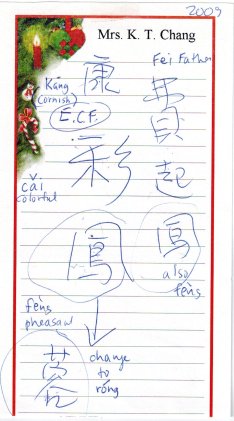
Nikki Bond- actually should be Nicole (nee Smith) Bond (106) married to Russell Bond (107)(Australian).
We have 2 children; a daughter Justine Bond (now Justine Penno married to Angus Penno) and a son Mark Bond. We all live in Perth, Western Australia.
99= Amy Hoare. My father(22) ( now deceased- 4.07.7010), Joseph (known as Joe) Phillip Smith married to Ellen Mary (nee Feng) Smith(101) also in Perth, Western Australia
My cousin; Robyn109 (female)(nee Milne) Gumley married Alistair Gumley110 ( of Edinburgh, Scotland) and are separated. They have one son; Neil Gumley 111now partnered (engaged) to Kassandre Murby112. They have one son, Lachlan Gumley113. They all live in Melbourne, Victoria, Australia.
Robyn's brother; John- actually Douglas Milne 108 ( Johnny is the name family use- his middle name)- not married. Lives in Melbourne also
Their father is Alan Milne 102 ( Australian , marine engineer) now remarried.
103 ( female) Madelaine
104 (female) Janine
105 (male) Hugh
-- Nikki (Nicole ) Bond
If your name is on the list, let me know what you would like to be shown. -- Gray Chang